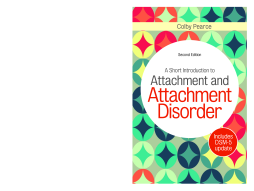
Additional Information
Book Details
Abstract
Concise and easy-to-understand, this book provides an introduction to what attachment means and how to recognise attachment disorder in children.
Colby Pearce explains how complex problems in childhood may stem from the parent-child relationship during a child's early formative years, and later from the child's engagement with the broader social world. The book explores the mind-set of difficult and traumatised children and the motivations behind their complex tendencies and behaviours. It goes on to offer a comprehensive set of tried-and-tested practical strategies that can be used with children affected by an attachment disorder. This second edition has been updated to include the new DSM-5 diagnostic criteria for Reactive Attachment Disorder and an increased number of illustrative case vignettes.
This is a perfect introduction to the subject for parents, carers and practitioners in supportive roles caring for children.
Colby Pearce is Principal Clinical Psychologist at Secure Start®, a private psychology practice based in Adelaide that provides psychology services to children, teens and families. He has extensive experience in the teaching and training of psychologists and other professionals, particularly in relation to insecure and attachment disordered children and the promotion of therapeutic care environments. He is also the author of A Short Introduction to Promoting Resilience in Children.
Although short, this revised edition remains for me a core text in supporting teachers' understanding of attachment, its importance and what happens when it goes wrong. Pearce makes this complex field highly accessible without losing any rigour; this book will be one of the most enlightening reads of your career.
Andy Bloor, Senior Lecturer in SEN and Disability Studies, University of Derby, UK
Practical, credible and evidenced based, this is a must read for all those working directly with troubled, challenging and unhappy children inside and outside the care system. Pearce explains the aetiology of different attachment disorders and provides workable strategies to support children consistently across their care, educational and therapeutic environments.
Lynne Peyton, Child Care Consultant, Author & Trainer, UK and Ireland
Colby Pearce provides answers. In a straightforward way, he defines and describes normal and disordered attachment. The first edition and my participation in Triple A training have added to my confidence and competence as a carer. This is a ' must read ' book for anyone involved with children. I am pleased to recommend it.
Margaret Quinn, Foster Carer
Table of Contents
| Section Title | Page | Action | Price |
|---|---|---|---|
| A Short Introduction to Attachment and Attachment Disorder, Second Edition by Colby Pearce | 3 | ||
| Acknowledgements | 6 | ||
| A Short Introduction | 9 | ||
| Prologue: A Tale of Four Mice | 13 | ||
| Chapter 1 - Understanding Attachment and the Influence of Parental Care | 15 | ||
| What is attachment? | 15 | ||
| What are the origins of Attachment Theory? | 16 | ||
| How does attachment develop? | 19 | ||
| What does attachment look like? | 21 | ||
| What different types of attachment exist? | 22 | ||
| How does caregiving impact attachment? The CARE Model | 25 | ||
| Why is attachment important? | 32 | ||
| Chapter summary | 36 | ||
| Matthew’s story | 38 | ||
| Chapter 2 - A Short Introduction to Attachment Disorder | 41 | ||
| What is attachment disorder? | 41 | ||
| CARE and attachment | 43 | ||
| CARE and arousal | 47 | ||
| CARE and learning | 54 | ||
| Specific manifestations of deficits in CARE | 57 | ||
| What does attachment disorder look like? | 58 | ||
| When should a diagnosis of attachment disorder be considered? | 63 | ||
| Chapter summary | 65 | ||
| Matthew’s story continued | 67 | ||
| Chapter 3 - Care to Promote Attachment Security | 70 | ||
| The importance of promoting strong and secure attachment relationships | 72 | ||
| Back to basics – the CARE Model | 74 | ||
| Be all powerful, all understanding, all knowing! | 111 | ||
| Additional considerations | 114 | ||
| Chapter summary | 115 | ||
| Matthew’s story continued | 116 | ||
| Chapter 4 - Treating Attachment Insecurity and Disorder | 120 | ||
| Fundamental Requirements for Effective Treatment | 120 | ||
| Consistency | 124 | ||
| Accessibility | 125 | ||
| Responsiveness | 126 | ||
| Emotional connectedness | 128 | ||
| Other considerations | 130 | ||
| What do we call this approach to treatment? | 131 | ||
| Chapter summary | 132 | ||
| Matthew’s story continued | 134 | ||
| Postscript | 138 | ||
| Glossary of terms | 141 | ||
| About the author | 145 | ||
| Notes | 147 | ||
| Index | 153 |
